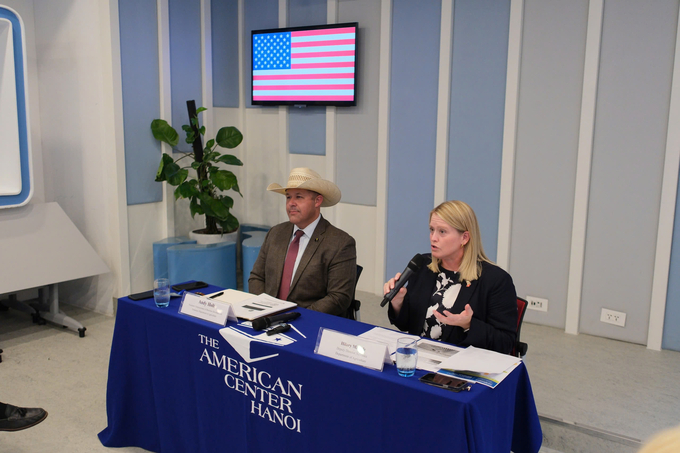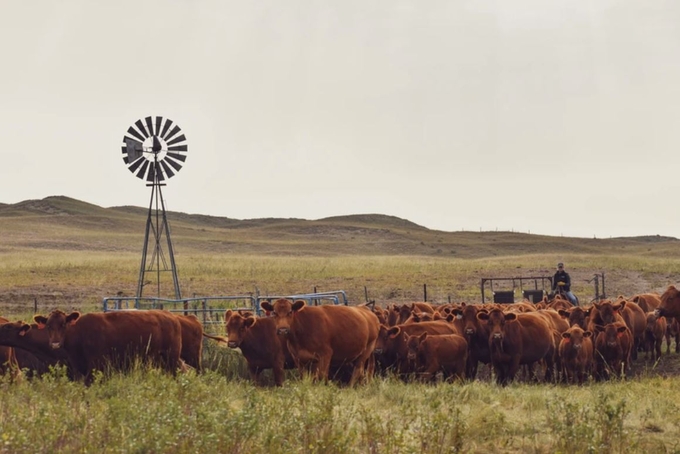December 18, 2025 | 00:57 GMT +7
December 18, 2025 | 00:57 GMT +7
Hotline: 0913.378.918
December 18, 2025 | 00:57 GMT +7
Hotline: 0913.378.918

The “Sustainable Agriculture in the U.S.” dialogue on September 12. Photo: Quynh Chi.
On September 12, at the dialogue titled “Sustainable Agriculture in the U.S.” hosted by the U.S. Embassy in Hanoi, Deputy Director Hilary Maricle of the Nebraska Department of Agriculture shared about the state’s experience in sustainable agriculture.
Maricle emphasized the importance of sustainability in U.S. agriculture, highlighting the efforts of American farmers and ranchers to ensure that their practices are forward-looking. The focus is on preserving natural resources to enable future generations to continue farming on the same land.
As a sixth-generation farmer from central Nebraska, Maricle oversees the cultivation of corn, soybeans, alfalfa, and the raising of beef and lamb. Her experience extends beyond farming; she previously worked with Nebraska Extension at the University of Nebraska-Lincoln, where she collaborated with farmers across the state’s 93 counties.
Maricle discussed the role of partnerships in sustainability and noted the significance of the recent upgrade in Vietnam - United States relations to a Comprehensive Strategic Partnership. She stressed that discussions on sustainability and entrepreneurship are inherently tied to the people involved.
Nebraska is a significant exporter to Vietnam, with total exports valued at $64.5 million in 2023. This includes $42.7 million worth of soybeans and soybean meal, $17.4 million in distiller's grains, and $3.5 million in other feeds and fodders.
Nebraska is a leading agricultural state, with 18 million hectares of farmland, accounting for 90% of its total land area. The state produces a variety of crops and livestock, including beef, corn, soybeans, pork, and dairy, with the dairy industry experiencing notable growth.
A key aspect of Nebraska’s sustainable practices is its extensive use of irrigation. Nearly all crop fields are irrigated, supported by a unique underground aquifer that replenishes with rainfall. This aquifer, located under sandy soil, is crucial for maintaining water quality and quantity, essential for sustainable farming.

Hilary Maricle (right) shared a perspective on sustainable development from Nebraska. Photo: Quynh Chi.
Nebraska’s climate varies from very hot to very cold, which impacts animal care. To ensure optimal conditions for livestock, many animals are housed in barns, promoting their health and growth. This setup allows farmers and ranchers to provide the best care and maintain animal well-being.
Nebraska beef is highly valued, with $3.5 million in exports. The state is also expanding its production of wheat, eggs, and dry edible beans, including being a top producer of great northern beans. Additionally, manure from livestock is used as fertilizer, contributing to the sustainability of Nebraska’s agricultural practices by enhancing soil health.
“On our farm, we raise cattle on grass rangeland while simultaneously cultivating corn and soybeans under irrigation pivots. The corn harvested is used to feed the cattle, which are then grown into beef”, Maricle shared.
A distinctive aspect of the state’s sustainability efforts involves planting cover crops, specifically rye, after the harvest. According to the Deputy Director, rye plays a crucial role in the Nebraska agricultural system. During the winter, cattle graze on the remaining corn stalks and any leftover corn that didn’t make it into the combine. In the spring, once the rye starts growing, the cattle graze on it, and calves are born in these fields. When the weather permits, cattle return to pastures, while some are kept in the feedlot.
The state also manages manure from cattle, hogs, and poultry with precision. Maricle noted, “We carefully measure the nutrient content of the manure to ensure optimal application rates. This targeted approach enhances soil health and supports the next cycle of planting”.

Flying Diamond Beef is a prominent ranch in Nebraska. Photo: FDB.
Any excess corn that is not used to feed the cattle is sold to an ethanol plant. The by-products, known as distiller's grains, are then returned to local ranches to feed the cattle, creating a beneficial loop. Similarly, soybeans are processed into soybean meal, which is fed to hogs and poultry, with some also being exported.
Center-pivot irrigation, a method developed and perfected in Nebraska, exemplifies efficient water use. This system delivers moisture directly to crops, optimizing water use and enhancing crop growth.
By integrating these practices, Nebraska creates a sustainable agricultural model that supports long-term farming and the production of protein for future generations.
American farmers and ranchers are increasingly committed to sustainability, ensuring that their practices support long-term food security, according to Mericle.
She emphasized: “Our goal is to not only maintain but also enhance our partnerships with countries like Vietnam, as we work to feed both our own families and others globally”.
Farmers across the U.S. are adopting sustainable practices, aiming to grow more with fewer natural resources. This approach allows for reliable protein sources in diets while supporting overall health and growth. Continued research and innovation play a crucial role, enabling us to do more with less and drive progress in sustainable agriculture.
For instance, recent discussions highlighted sustainable U.S. soy, emphasizing its role in our agricultural practices. In Nebraska, feed grains and beef remain vital to our agricultural exports and relationships. Farmers and ranchers in Nebraska are dedicated to raising food and feed with the utmost care, ensuring that we not only meet current needs but also preserve natural resources for future generations.
Nebraska’s commitment extends to managing soil and water resources meticulously, supporting the next generation of farmers to grow even more food sustainably. By prioritizing these efforts, the state aims to continue providing high-quality food and feed while upholding our dedication to sustainability.

(VAN) 2025 AQUASTAT Water Data indicates that pressure on freshwater resources is growing as demand increases in regions of scarcity.

(VAN) Planet-warming pollution rates exploded after the end of World War II. James Watt’s steam engine launched the Industrial Revolution in 1769.

(VAN) The British Department for Environment, Food & Rural Affairs (Defra) has amended and extended a derogation for organic poultry and pigs, which currently allows up to 5% non-organic protein in feed.

(VAN) The Ah Louis Store in San Luis Obispo, California, turns into a winter wonderland every holiday season.

(VAN) Japanese feed millers are increasingly incorporating corn into their rations, in response to sustained high rice prices, according to a recent Grain and Feed Update from the Foreign Agricultural Service (FAS) of USDA.

(VAN) The event calls for urgent action to preserve glaciers, and recognises Mountain Future Award-winning projects in Colombia, Kyrgyzstan and Pakistan that protect mountain ecosystems and build resilience.

(VAN) New evidence shows that the health impacts of the Industrial Revolution varied more widely than previously believed, challenging the longstanding narrative that rural communities remained comparatively untouched.